英语语法整理之从句
英语语法高中从句语法

英语语法高中从句语法高中的英语语法是比较基础的,我们来讲一讲它的一些从句类的吧。
下面是店铺给大家整理的高中英语从句语法,供大家参阅!高中英语从句语法:同位语从句1、关联词不能省略2、从句用陈述语序从句的名词后接同位语fact, idea, word,promise, saying,problem, news常见引导词that, whether, where, how, etc.The facts that he succeeded in the experiment pleased us.An idea came to her that she might do that in another way.Scientists have argued over the problem whether there is life on other planets.高中英语从句语法:表语从句1、关联词不能省略2、从句用陈述语序常见引导词what, when, where, why, whether, how, that, because, which, What surprised me most was that he spoke English so well.The question is how what you’ve said can be put into practice.The reason (why ) he didn’t come is that he was ill.It (This , That) is because iron contains more carbon than steel.高中英语从句语法:名词从句概述一.定义: 在句中的作用相当于一个名词的从句叫做名词性从句二.分类: 名词性从句包括四类, 分别是: 主语从句, 宾语从句, 表语从句, 同位语从句三.引导词: 名词从句的引导词包括连词that / if / whether, 连接代词who / whom / whose / what / which, 连接副词when / where / how / why, 另外还有: whatever, whichever, whoever等主语从句一.定义: 在句中充当主语的从句就是主语从句二.示例:a. That he looked at me in that strange way puzzled me.b. Whether we can control the floods is still uncertain.c. What he wanted to see was an end to all the armies of the world.d. When the broadcast station will be ready is unknown.e. Who made the long distance call to him is not important.f. Whether we’ll go depends on the weather.三.应注意的问题:1.以that引导主语从句时, 常用it作形式主语, 而把真正主语后移, 如在以下句型中就是如此: It is + adj / n + that...; It is said / reported / hoped that...a. It is certain that fuels like coal and oil cause a lot of pollution.b. It was said that only three people in the world could understand it at that time.2.whether引导主语从句时, 常置于句首(此时whether不能用if 代替), 也有后移的用法 (此时whether可以用if代替)a. Whether they will come is not yet known.b. It is not yet known whether they will go there.3.连接代词who, what, which和连接副词when, where, how, why引导主语从句时, 一般不后移a. What I told you last night was really true.b. Which team will win the game is not yet known.c. How they went to the USA is still a puzzle.宾语从句一.定义: 在句中充当宾语的从句就是宾语从句. 谓语动词, 非谓语动词, 介词都可以带有宾语从句二.示例:1.谓语动词的宾语从句:a. They knew that the habit may kill them.b. She asked whether / if there were any chemist’s shops in this street.c. The teacher told them who first invented the television set.d. I want to know whose notebook is left on the table in the reading room.e. Can you tell me where the Great Pyramid is ?2.非谓语动词的宾语从句:a. Having known what he had done in school, his father was very angry.3.介词的宾语从句:a. They talked half an hour about what happened in the school.b. He is pleased with what we did yesterday.c. Leifeng always thought of how he can do more for the people.三.应注意的问题:1.句中有宾语从句且有宾补时, 通常用it作形式宾语, 而把宾语从句移到宾补后a. We think it wrong that he didn’t hel p Tom.b. I feel it possible that you will finish the work in a day.2.that从句一般不作介词的宾语, 但except等少数表示“除外”的介词除外a. I know nothing about him except that he lives next door.3.关于主句和宾语从句的时态呼应:①.如果主句是过去时, 宾语从句应是“过去”范畴的某时态a. He said he would fly to Egypt next day.b. He remembered that he had left her umbrella in the library.②.如果宾语从句表示的是客观真理或普遍现象, 可以保持“现在”范畴时态, 而不与主句时态呼应a. The teacher told us that light travels faster than sound.③.如果主句是一般现在时或一般将来时, 宾语从句根据情况选用所需要的时态4.关于宾语从句的“否定转移”: 主句的谓语动词为这些词( think, believe, expect, imagine, suppose, guess等)时, 宾语从句的否定转移到主句中去a. I don’t think he will come.b. I don’t think there are living things on the moon.表语从句一.定义: 在句中充当表语的从句就是表语从句二.示例:a. My idea is that we should help mother do house work every day.b. The question is whether we can catch the early bus.c. Nicotine! That’s what the smokers need.d. Ten years of hard work! That’s why I now look so old.同位语从句一.定义: 在一个名词或代词(如: news, fact, idea, hope, promise, problem, possibility等)后面, 对其作进一步的解释、说明的从句称为同位语从句二.示例:a. I don’t know the fact that the fireman was killed in the fire.b. I have no idea when Jack will be back.c. He can’t answer the question how he got the money.d. There is no doubt that she is fit for the job.e. The news that our team has won the game is very exciting.f. I didn’t tell mother the fact that I met with an accident on my way home.常见问题一.that引导名词从句与定语从句的区别:1.引导名词从句的that本身无词义, 只起引导作用, 在从句中并不充当任何句子成分; 而引导定语从句的that是关系代词, 有词义(指代先行词), 除了起引导作用之外, 还在从句中充当句子成分2.引导宾语从句的that可省略, 引导其他名词从句的that一般不能省略; 而引导定语从句的that如果在定语从句中充当宾语, 也可以省略a. I know that smoking does harm to people’s health. (宾语从句)b. The text tells me a fact that I have already known. (定语从句)c. The news that he had passed the examination made her parents very happy.(同位语从句)d. The news that he told me yesterday made me surprised.(定语从句)二.which引导名词从句与定语从句的区别:which引导名词从句时, 其含义是“哪一个, 哪一些”; which引导定语从句时, 指代先行词, 其含义就是先行词的意思a. There are so many beautiful caps in the shop. I really don’t know which one I should choose.(宾语从句)b. I will never forget the days which we spent in the countryside. (定语从句)三.that / what引导名词从句的区别:引导名词从句时, that本身无词义, 只起引导作用, 在从句中也不充当任何句子成分; what有词义, what引导的名词从句的含义是“…的事 / 物 (任何抽象的或具体的物) ”, what在从句中也充当一个成分a. They knew that the habit may kill them.b. What he wanted to see (“他想看到的事”)was an end to all the armies of the world.c. Nicotine! That’s what the smokers need.(“抽烟者所需要的东西”)四.引导名词从句时只用whether, 不用if的情况:1.引导主语从句时:a. Whether the 2000 Olympic Games will be held in Beijing is not known yet.2.引导表语从句时:a. The problem is whether we need it.3.引导介词后的宾语从句时:a. He was worried about whether he passed the exam.4.与or not连用时:a. It doesn’t matter whether she will come or not.5.置于不定式之前时:a. I don’t know whether to go.6.引导同位语从句时:a. The problem whether we’ll build another school hasn’t been settled.五.名词从句的语序问题: 名词从句中都要使用陈述语序, 参看前文例句2.引导表语从句时:a. The problem is whether we need it.3.引导介词后的宾语从句时:a. He was worried about whether he passed the exam.4.与or not连用时:a. It doesn’t matter whether she will come or not.5.置于不定式之前时:a. I don’t know whether to go.6.引导同位语从句时:a. The problem whether we’ll build another school hasn’t been settled高中英语从句语法:状语从句一.定义: 在句中作状语的从句就叫做状语从句二.分类: 状语从句包括以下八类1.时间状语从句: 由when, while, as, before, after, since, till / until, as soon as等引导a. I shall tell him the good news when he comes.2.原因状语从句: 由because, as, since, for等引导a. He didn’t hear me because he was listening to the radio.b. Since you are free today, you had better show me how to use the computer.3.地点状语从句: 由where等引导a. Please put the book where it was after you finish reading it.4.条件状语从句: 由if, unless等引导a. I will come to see you if I have time on Sunday.5.比较或方式状语从句: 由than, as, as if, as...as...等引导a. I know you do better than he does.b. The old worker runs very fast as if he were a young man.6.目的状语从句: 由so that, in order that等引导a. They set out early so that they could arrive at the station in good time.7.结果状语从句: 由so, so that, so / such...that...等引导a. They set out early so that they arrived at the station in good time.b. He finished his work so well that the boss praised him inpublic.8.让步状语从句: 由though / although, even if, whatever, whoever, whenever, no matter what / who等引导a. He is in very good health though he is old.b. They didn’t stop working even if it began to rain hard.三.应注意的问题:1.时间和条件状语从句中常用一般时代替将来时a. I will go and see a film if I have time tomorrow.b. I will tell the about it as soon as he comes back.c. He said he would go out for a walk when he finished his work.2.状语从句中可有省略: 在一个含有状语从句的复合句中, 如果主句和状语从句的主语相同, 或状语从句的主语是it, 并且状语从句的谓语含有be动词时, 可以将状语从句的主语和be一起省略掉a. As (she was ) a child, she began to learn English.b. If ( he was ) alive, he must be at least ninety years old.c. Although ( he was ) told to stop, he kept on working.d. If ( it is) necessary, ring me up.e. He didn’t sa y a single word until ( he was ) asked.3.as和than引导的比较状语从句中, 从句中和主句中相同的部分往往省略, 从句中只剩下比较对象a. He is a head taller than I ( am tall ).than之后的人称代词是主格或宾格时, 有时意思不同, 如:a. She likes the dog more than me.=She likes the dog more than she likes me.她喜欢狗比喜欢我更多b. She likes the dog more than I.=She likes the dog more than I like the god. 她比我更喜欢狗4.含有no sooner…than…和hardly / barely / scarcely …when…的句子相当于含有as soon as…引导的时间状语的句子. no sooner或hardly放在句首时, 主谓要部分倒装a. He had no sooner seen the policeman than he ran away. =No sooner had he seen the policeman than he ran away. =He ran away as soon as he saw the policemen.b. He had hardly sat down when the telephone rang. =Hardly had he sat down when the telephone rang. =The telephone rang as soon as he sat down.5.immediately, directly, instantly等词也可以作为连词引导时间状语从句, 相当于as soon as引导的时间状语a. I went to see him immediately I heard from him. =I went to see him as soon as I heard from him.6.the moment, the minute, the second引导时间状语从句, 相当于as soon as引导的时间状语a. He let out a cry the moment he saw the snake.=He let outa cry as soon as he saw the snake.7.each time, every time, any time, last time, next time, first time可以引导时间状语从句a. They shake hands with each other each time they meet.8.since引导的时间状语从句中, 若谓语动词是延续性动词或状态动词, 则其过去时表示动作的完成或状态的结束a. It is five years since he lived here. 他不住这里己有五年了a. They shake hands with each other each time they meet.8.since引导的时间状语从句中, 若谓语动词是延续性动词或状态动词, 则其过去时表示动作的完成或状态的结束a. It is five years since he lived here. 他不住这里己有五年了。
英语语法:状语从句归纳整理
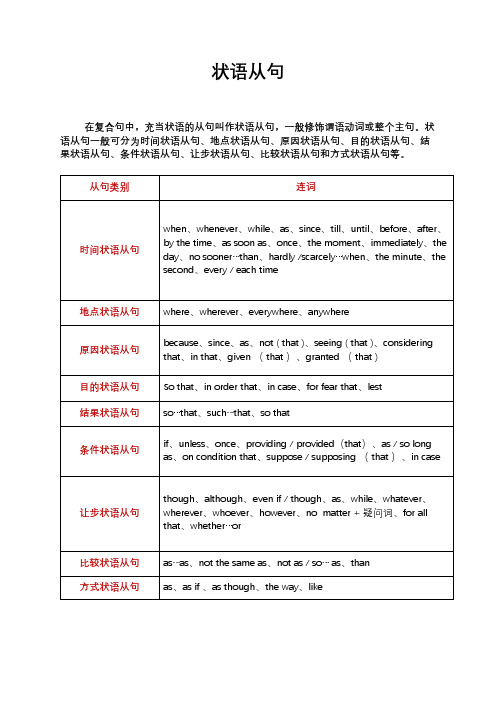
状语从句在复合句中,充当状语的从句叫作状语从句,一般修饰谓语动词或整个主句。
状语从句一般可分为时间状语从句、地点状语从句、原因状语从句、目的状语从句、结果状语从句、条件状语从句、让步状语从句、比较状语从句和方式状语从句等。
一、时间状语从句在复合句中起时间状语作用的从句称为时间状语从句,可放在句首、句中或句尾。
(二)until 和 till的用法1.肯定句:主句的谓语动词必须是延续性动词,主句、从句都为肯定式,意为“直到……为止”;2.否定句:主句的谓语动词必须是非延续性动词,从句为肯定式,表示“某动作直到某时才开始”;3.till 不可以置于句首,而until可以。
例:They waited till / until I returned.他们一直在等我回来。
You may stay here until / till the rain stops.你可以待在这里直到雨停。
He won’t go to bed until / till she returns.直到她回来,他才上床睡觉。
Until you told me I had no idea of it.直到你告诉我,我才知道这件事。
(三)since的用法(四)before的用法一般情况下before表示“在……之前”,有时根据上下文,还可表示“还未……就……” “不到……就……” “……才……” “趁……还未……”等例:Please write it down before you forget it.趁你还没忘,请把它记下来。
I must finish this letter before I go home.我必须在回家之前完成这封信。
Before I could get in a word, he had measured me.我还没来得及插话,他就给我量好了尺寸。
We had sailed four days and four nights before we saw land.我们航行了四天四夜才看到陆地。
高中英语语法总结之状语从句(共37张ppt)

• Difficulties are nothing if we are not afraid of them.如果我们不怕困难,困难就算不了什 么了。
• We shall go there tomorrow unless it rains. = We shall go there tomorrow if it doesn’t rain. 除非下雨,我们明天就去那里。
• Every time I travelled by boat, I got seasick.我 每次乘船都晕船。
• The moment I heard the song, I felt cheerful. 我一听到这首歌,就感到很愉快。
• Next time you come ,you’ll see him.下次你来 的时候,就会见到他。
• We were not tired though (although) we had worked all day.虽然我们干了一天活,但并 不累。
• (2)even if, even though(even if 和even though的意思为“即使”“纵使”有退一步 设想的意味,多用于书面语中)。
• 5、结果状语从句:
• (1)so that,so…that(so that前有逗号为 结果状语从句,so…that的so后面跟形容词 或副词)。
• We turned up the radio, so that everyone heard the news.我们把收音机的音量放大, 大家都听到了新闻。
• Seeing (that) he was badly ill, we sent for the doctor.鉴于他病情严重,我们派人去请医生 去了。
高中英语语法总结大全之名词性从句
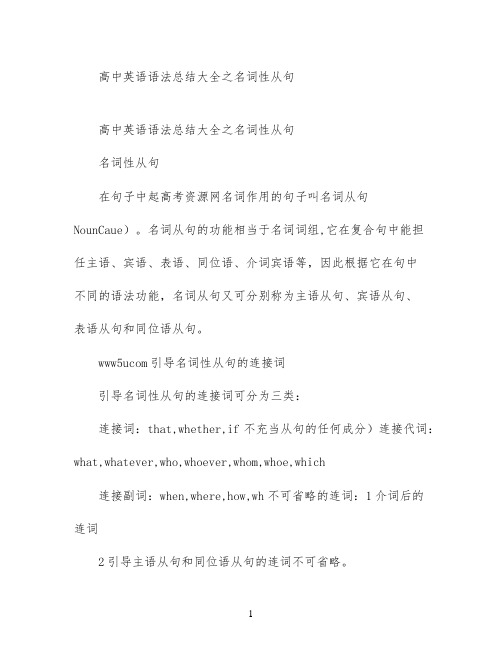
高中英语语法总结大全之名词性从句高中英语语法总结大全之名词性从句名词性从句在句子中起高考资源网名词作用的句子叫名词从句NounCaue)。
名词从句的功能相当于名词词组,它在复合句中能担任主语、宾语、表语、同位语、介词宾语等,因此根据它在句中不同的语法功能,名词从句又可分别称为主语从句、宾语从句、表语从句和同位语从句。
www5ucom引导名词性从句的连接词引导名词性从句的连接词可分为三类:连接词:that,whether,if不充当从句的任何成分)连接代词:what,whatever,who,whoever,whom,whoe,which连接副词:when,where,how,wh不可省略的连词:1介词后的连词2引导主语从句和同位语从句的连词不可省略。
比较:whether与if均为"是否"的意思。
但在下列情况下,whether不能被if取代:从句作介词宾语4从句后有"ornot"Whetherhewicomeinotcear大部分连接词引导的主语从句都可以置于句末,用it充当形式主语。
Itinotimmonnowedgethat………是常识Itiaure她怀疑我们是否能够前来。
介词宾语:Iworraboutwhetherhecane我相信他不回来。
注意:若谓语动词为hoeinotcear大部分连接词引导的主语从句都可以置于句末,用it充当形式主语。
Itinotimmonnowedgethat………是常识Itiaure她怀疑我们是否能够前来。
介词宾语:Iworraboutwhetherhecane我相信他不回来。
1)注意:若谓语动词为ho,athatthenowwheretogo本资料由阳光家教网整理看来他们不知道往哪去。
Itdoen"taorrow看来我们明天不会碰上好天气。
2)有时将动名词,介词短语或整个从句的否定转变为对谓语动词的否定。
Idon"trememberhavingevereenuchaman我记得从未见过这样一个人。
英语语法之定语从句

英语语法之定语从句一、定语从句定语从句(Attributi ve Clauses)在句中做定语,修饰一个名词或代词,被修饰的名词,词组或代词即先行词。
定语从句通常出现在先行词之后,由关系词(关系代词或关系副词)引出。
关系代词有:who, whom, whose, that, which等。
关系副词有:when, where, why等。
二、关系代词引导的定语从句关系代词所代替的先行词是人或物的名词或代词,并在句中充当主语、宾语、定语等成分。
关系代词在定语从句中作主语时,从句谓语动词的人称和数要和先行词保持一致。
1)who, whom, that这些词代替的先行词是人的名词或代词,在从句中所起作用如下:Is he the man who/that wants to see you?他就是你想见的人吗?(who/that在从句中作主语)He is the man whom/ that I saw yesterday.他就是我昨天见的那个人。
(whom/that在从句中作宾语)2) Whose 用来指人或物,(只用作定语, 若指物,它还可以同of which互换), 例如:They rushed over to help the man whose car had broken down.那人车坏了,大家都跑过去帮忙。
Please pass me the book whose (of which) cover is green.请递给我那本绿皮的书。
3)which, that它们所代替的先行词是事物的名词或代词,在从句中可作主语、宾语等,例如:A prosperity which / that had never been seen before appears in the countryside. 农村出现了前所未有的繁荣。
(which / that在句中作宾语)The package (which / that) you are carrying is about to come unwrapped. 你拿的包快散了。
英语语法10之同位语从句

一、同位语从句
3.在名词doubt之后的同位语从句,有两种情况: (1)doubt之后用whether引导。 举例:I have my doubts whether the boy can pass the entrance examnation. (2)no doubt之后用that引导。 举例:There can be no doubt that cancer can be cured by mankind in the near fuliture. ◎连词but that也可以引导同位语从句,通常用在“否定词+doubt/deny/question等 名词”结构之后。这时,but仅起强调作用,无否定含义,常可省略;有时可省略 that,而保留but。 举例:There is no question (but) that the four modernizations will be realized in China in the near future.
二、that引导的同位语从句和that引导的定语从 句的区别
1.同位语从句中的that是从属连词,在从句中不作成分;而在定语从句中的that是 关系代词,它要代替先行词,还要在句中作成分。 举例:The news that our director will go to America is ture.
同位语从句
一、同位语从句
把从句放在一个名词之后,以进一步说明该词的情况、内容实质,并与该 词处于同等地位,这种从句叫同位语从句。从句所说明的词叫本位词,多是表 示抽象的概念或表示一个问题的名词;从句和本位词之间不用逗号分开。
高中英语语法之名词性从句-(1)
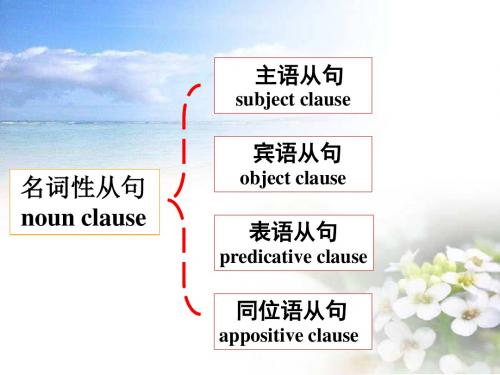
5. “疑问词+ever” whatever, whichever, whoever, whomever 引导宾语从句 I’ll show you whatever you want to see. He likes to makes friends with whoever shares his interest.
二、注意正确使用时态
1. 如果主句是一般现在时、一般将来时或祈使句时,宾 语从句时态不受限制 I hear he is here today/ he was here yesterday/ he will be here tomorrow. 2. 如果主句是一般过去时,宾语从句应与主句保持一致, 即使用过去时态的某种形式。 He said he was watching TV/ he had swept the floor/ he would play football after school. 3. 如果宾语从句所叙述的是客观事实、自然现象、科学 真理等时,从句不受主句限制,用一般现在时。 Everyone answered there are sixty minutes in an hour.
• 2.引导主语从句的词: • 连词:that, whether
起连接作用不充当成分
• 连接代词:what(ever),who(ever), which(ever),whose,
充当主语/宾语/定语等
• 连接副词:when, where, how ,why
充当状语表时间、地点、方式、原因
连接副词:when, where, how ,why引导的主语从句
1.I hear (that)___________.(一小时后会回来)
2.He said (that)___________.(他非常想我们) 3.The teacher told us (that)_____________. (地球围绕太阳转)
高中英语语法知识串讲之定语从句
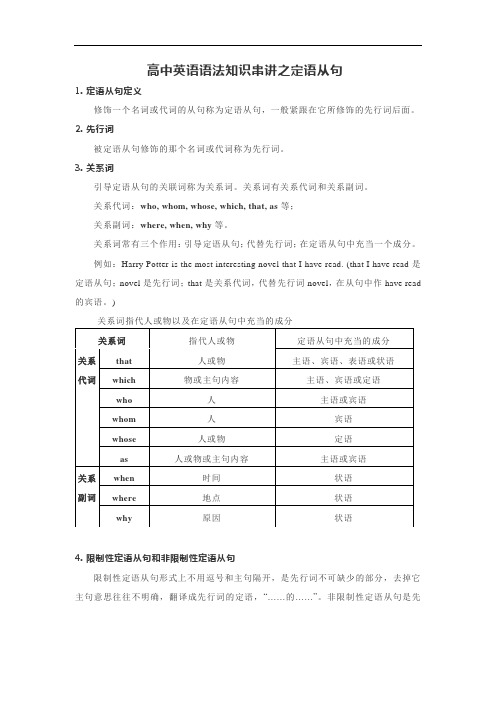
行词的附加说明,去掉了也不会影响主句的意思,它与主句之间通常用逗号分开,通常翻译成主句的并列句。
关系代词that和关系副词why不能引导非限制性定语从句。
His brother who is now a lawyer always encourages him to go to college.他那个现在是律师的哥哥总是鼓励他上大学。
(他还有其他的哥哥)His brother, who is now a lawyer, always encourages him to go to college.他的哥哥,现在是律师,总是鼓励他上大学。
(他只有一个哥哥)一、关系代词的使用【例句观察】①She is the woman (whom / that / who)I wanted to see yesterday. 她是我昨天想看的那个女的。
②The package (which / that)you are carrying is about to come unwrapped. 你扛着的包裹马上要拆开。
③Obama won the Nobel Prize for Peace in the year 2009, which we hadn't expected. Obama在2009年得诺贝尔和平奖是大家都没想到的。
④Your parents are the ones to whom you can turn when you are in trouble. 你父母是你困难时可以求助的人。
【例句分析】①whom / that / who指人,在限制性定语从句中作wanted to see的宾语,可以省略。
②which / that指物,在限制性定语从句中作are carrying的宾语,可以省略。
③which指前面主句内容,在非限制性定语从句中作宾语,但不能省略。
④whom前有介词to,虽然作宾语,但不能省略。
英语的从句类型与用法总结资料
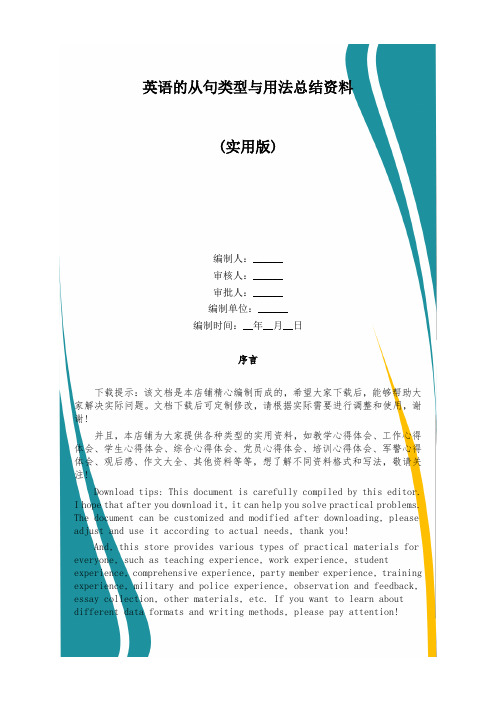
英语的从句类型与用法总结资料(实用版)编制人:______审核人:______审批人:______编制单位:______编制时间:__年__月__日序言下载提示:该文档是本店铺精心编制而成的,希望大家下载后,能够帮助大家解决实际问题。
文档下载后可定制修改,请根据实际需要进行调整和使用,谢谢!并且,本店铺为大家提供各种类型的实用资料,如教学心得体会、工作心得体会、学生心得体会、综合心得体会、党员心得体会、培训心得体会、军警心得体会、观后感、作文大全、其他资料等等,想了解不同资料格式和写法,敬请关注!Download tips: This document is carefully compiled by this editor.I hope that after you download it, it can help you solve practical problems. The document can be customized and modified after downloading, please adjust and use it according to actual needs, thank you!And, this store provides various types of practical materials for everyone, such as teaching experience, work experience, student experience, comprehensive experience, party member experience, training experience, military and police experience, observation and feedback, essay collection, other materials, etc. If you want to learn about different data formats and writing methods, please pay attention!英语的从句类型与用法总结资料英语语法不多,但是高中语法对大家来说稍有难度,所以还应以理解为主,易混淆的语法要放在一起进行对比记忆。
高中英语:从句语法知识大梳理

高中英语:从句语法知识大梳理从句的基础概念由一个主句和一个或一个以上从句构成的句子叫做复合句。
所谓主句,就是在复合句中起统领作用的句子,它是全句的主体,通常可以独立存在;而从句则是复合句的一个句子成分,不能独立存在。
如:You’ll feel better after you take the pills. 吃完药丸后你会感到好一些。
主句是You’ll feel better,从句是after you take the pills,由after引导,在整个复合句中用作状语,表示时间。
注意,英语的复合句不是简单句的反面,不要将它误解为“复杂句”。
事实上,英语的简单句有时也可以比较“复杂”,而复合句也可以比较“简单”。
如:He stopped because he was tired. 他停下来是因为他累了。
这个句子比较“简单”,却是一个典型的复合句,其中的he stopped是主句,because he was tired是从句,在复合句中用作状语,表示原因。
从句的分类一般说来,一个从句在复合句充当什么成分我们就叫它为什么从句——从句在复合句用作主语,我们就叫它为主语从句;从句在复合句用作宾语,我们就叫它为宾语从句等。
如:He answered that he knew nothing about it. 他回答说他不知情。
that 引导的从句在复合句中用作动词answered的宾语,因此为宾语从句。
The trouble is that I have lost his address. 麻烦的是我把他的地址丢了。
be动词后做表语从句He was rather pleased when he won that prize. 他获奖后相当高兴。
用状语表时间,也叫时间状语从句。
名词性从句(主语从句、表语从句、宾语从句、同位语从句)主语从句、表语从句、宾语从句和同位语从句在复合句中的充当的成分和其名称相同,分别作主句的主语、表语、宾语和同位语。
英语语法讲解之定语从句
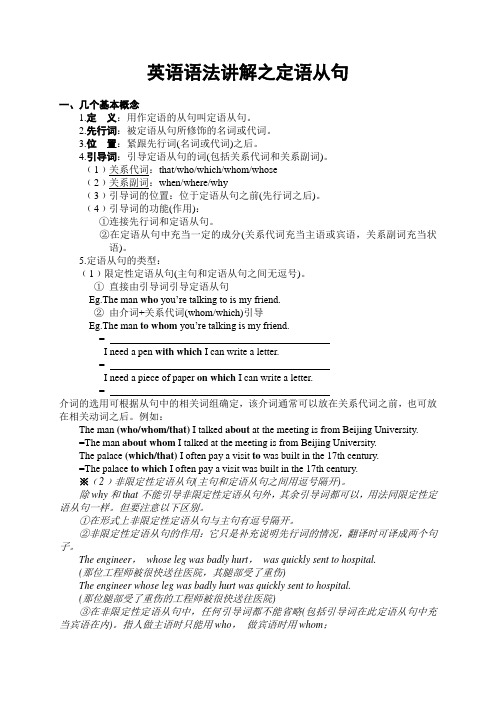
英语语法讲解之定语从句一、几个基本概念1.定义:用作定语的从句叫定语从句。
2.先行词:被定语从句所修饰的名词或代词。
3.位置:紧跟先行词(名词或代词)之后。
4.引导词:引导定语从句的词(包括关系代词和关系副词)。
﹙1﹚关系代词:that/who/which/whom/whose﹙2﹚关系副词:when/where/why﹙3﹚引导词的位置:位于定语从句之前(先行词之后)。
﹙4﹚引导词的功能(作用):①连接先行词和定语从句。
②在定语从句中充当一定的成分(关系代词充当主语或宾语,关系副词充当状语)。
5.定语从句的类型:﹙1﹚限定性定语从句(主句和定语从句之间无逗号)。
①直接由引导词引导定语从句Eg.The man who you’re talking to is my friend.②由介词+关系代词(whom/which)引导Eg.The man to whom you’re talking is my friend.=I need a pen with which I can write a letter.=I need a piece of paper on which I can write a letter.=介词的选用可根据从句中的相关词组确定,该介词通常可以放在关系代词之前,也可放在相关动词之后。
例如:The man (who/whom/that) I talked about at the meeting is from Beijing University.=The man about whom I talked at the meeting is from Beijing University.The palace (which/that) I often pay a visit to was built in the 17th century.=The palace to which I often pay a visit was built in the 17th century.※﹙2﹚非限定性定语从句(主句和定语从句之间用逗号隔开)。
高中英语语法知识点整理
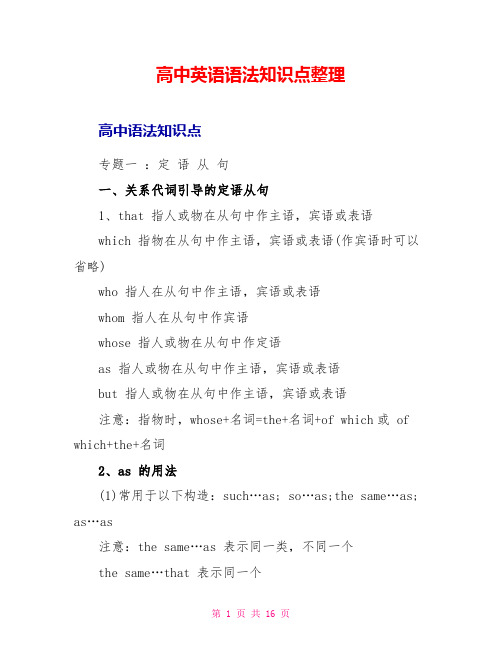
高中英语语法知识点整理高中语法知识点专题一:定语从句一、关系代词引导的定语从句1、that 指人或物在从句中作主语,宾语或表语which 指物在从句中作主语,宾语或表语(作宾语时可以省略)who 指人在从句中作主语,宾语或表语whom 指人在从句中作宾语whose 指人或物在从句中作定语as 指人或物在从句中作主语,宾语或表语but 指人或物在从句中作主语,宾语或表语注意:指物时,whose+名词=the+名词+of which或 of which+the+名词2、as 的用法(1)常用于以下构造:such…as; so…as;the same…as; as…as注意:the same…as 表示同一类,不同一个the same…that 表示同一个(2)as与which的区别a、位置不同as可放在主句后,主句前或主句中间;which只能放在主句后。
b、as起连接作用,表达说话人的观点、看法,并指出主句内容的根据或出处,意为“正如,正像”。
Which相当于并列句,可以用and this来代替,意为“这一点,这件事’”。
注意:as常用于以下构造:as we know/ as is known to all, as we all can see, as has beensaidbefore/above,as might be excepted, as is often the case, 一般不能用which代替as。
c、在从句中作主语时,which既可作系动词be的主语也可作实义动词的主语,而as只可作系动词be的主语。
二、只用that不用which的情况1、.先行词为 all , much, everything, nothing , something ,anything, nothing,none, the one等不定代词时2、先行词被only, any, few, little, no , all,just , very ,right等修饰时.3、领先行词是最高级或被形容词最高级修饰时。
高中英语语法知识之名词性从句

名词性从句相关概念名词性从句:在复合句中起名词的从句叫做名词性从句。
包括:主语从句、宾语从句、表语从句、同位语从句。
名词性从句引导词:●连接词 that引导名词性从句时,只起连接作用,没有任何意思,也不充当句子成分。
I hope (that) you enjoy your holiday.That he likes you is very obvious.●连接词 whether, if引导名词性从句时,不充当句子成分,但有自己的意思,表示“是否”He asked whether [if] I would show him the way.Whether it will do us harm remains to be seen.●连接代词 who, whom, whose, which, what, whatever, whoever, whomever, whichever引导名词性从句时,均有各自的意义,在从句中作主语、宾语、定语等。
如:Who broke the glass yesterday is not clear.She will give whoever needs help a warm support.●连接副词 when, where, why, how, however, whenever, wherever引导名词性从句,也各自有自己的意义,在从句中作状语。
The question is how we should carry out the plan.When she’ll be back depends much on the weather.宾语从句★位置:A. 作动词宾语He has informed me when they are to discuss the work plan.注意:doubt(怀疑)的肯定句接if/ whether引导的宾语从句,但否定句和疑问句接that引导的宾语从句。
高中英语语法之从句篇(简单,实用,短期内搞定英语从句)
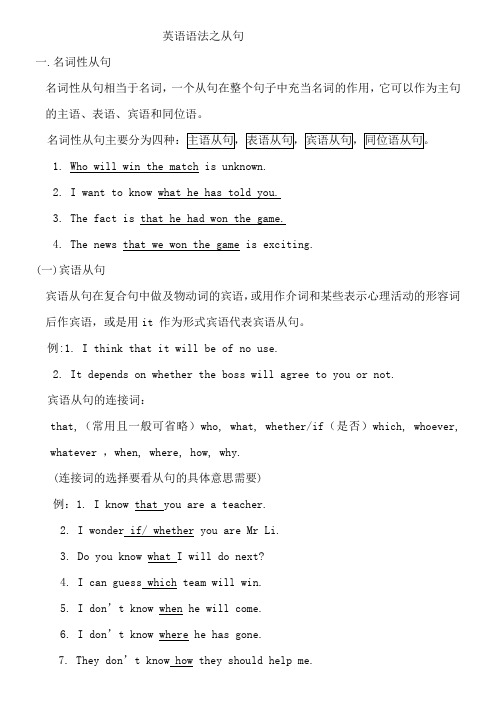
英语语法之从句一.名词性从句名词性从句相当于名词,一个从句在整个句子中充当名词的作用,它可以作为主句的主语、表语、宾语和同位语。
1. Who will win the match is unknown.2. I want to know what he has told you.3. The fact is that he had won the game.4. The news that we won the game is exciting.(一)宾语从句宾语从句在复合句中做及物动词的宾语,或用作介词和某些表示心理活动的形容词后作宾语,或是用it 作为形式宾语代表宾语从句。
例:1. I think that it will be of no use.2. It depends on whether the boss will agree to you or not.宾语从句的连接词:that,(常用且一般可省略)who, what, whether/if(是否)which, whoever, whatever ,when, where, how, why.(连接词的选择要看从句的具体意思需要)例:1. I know that you are a teacher.2. I wonder if/ whether you are Mr Li.3. Do you know what I will do next?4. I can guess which team will win.5. I don’t know when he will come.6. I don’t know where he has gone.7. They don’t know how they should help me.8. Please give the book to whoever likes it.Attention:①★宾语从句的语序一定是正常的语序,即陈述句的语序,先主语后谓语。
高中英语语法总结名词性从句
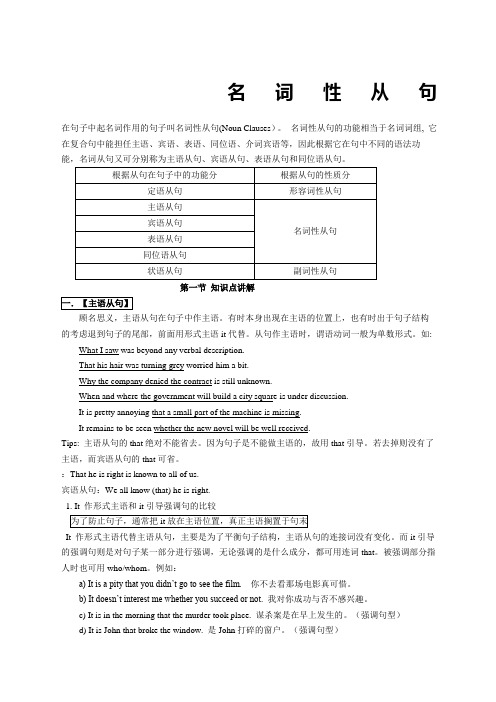
名词性从句在句子中起名词作用的句子叫名词性从句(Noun Clauses)。
名词性从句的功能相当于名词词组, 它在复合句中能担任主语、宾语、表语、同位语、介词宾语等,因此根据它在句中不同的语法功能,名词从句又可分别称为主语从句、宾语从句、表语从句和同位语从句。
第一节知识点讲解顾名思义,主语从句在句子中作主语。
有时本身出现在主语的位置上,也有时出于句子结构的考虑退到句子的尾部,前面用形式主语it代替。
从句作主语时,谓语动词一般为单数形式。
如: What I saw was beyond any verbal description.That his hair was turning grey worried him a bit.Why the company denied the contract is still unknown.When and where the government will build a city square is under discussion.It is pretty annoying that a small part of the machine is missing.It remains to be seen whether the new novel will be well received.Tips: 主语从句的that绝对不能省去。
因为句子是不能做主语的,故用that引导。
若去掉则没有了主语,而宾语从句的that可省。
:That he is right is known to all of us.宾语从句:We all know (that) he is right.1. It 作形式主语和it引导强调句的比较It 作形式主语代替主语从句,主要是为了平衡句子结构,主语从句的连接词没有变化。
而it引导的强调句则是对句子某一部分进行强调,无论强调的是什么成分,都可用连词that。
英语语法中从句的使用
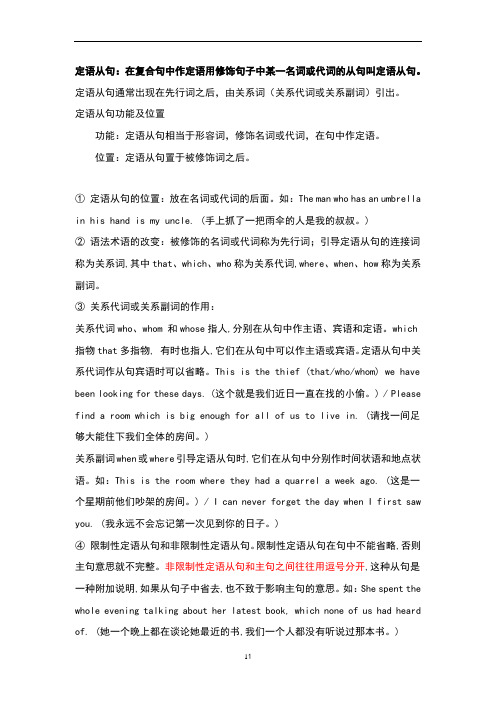
定语从句:在复合句中作定语用修饰句子中某一名词或代词的从句叫定语从句。
定语从句通常出现在先行词之后,由关系词(关系代词或关系副词)引出。
定语从句功能及位置功能:定语从句相当于形容词,修饰名词或代词,在句中作定语。
位置:定语从句置于被修饰词之后。
① 定语从句的位置:放在名词或代词的后面。
如:The man who has an umbrella in his hand is my uncle. (手上抓了一把雨伞的人是我的叔叔。
)② 语法术语的改变:被修饰的名词或代词称为先行词;引导定语从句的连接词称为关系词,其中that、which、who称为关系代词,where、when、how称为关系副词。
③ 关系代词或关系副词的作用:关系代词who、whom 和whose指人,分别在从句中作主语、宾语和定语。
which 指物that多指物, 有时也指人,它们在从句中可以作主语或宾语。
定语从句中关系代词作从句宾语时可以省略。
This is the thief (that/who/whom) we have been looking for these days. (这个就是我们近日一直在找的小偷。
) / Please find a room which is big enough for all of us to live in. (请找一间足够大能住下我们全体的房间。
)关系副词when或where引导定语从句时,它们在从句中分别作时间状语和地点状语。
如:This is the room where they had a quarrel a week ago. (这是一个星期前他们吵架的房间。
) / I can never forget the day when I first saw you. (我永远不会忘记第一次见到你的日子。
)④ 限制性定语从句和非限制性定语从句。
限制性定语从句在句中不能省略,否则主句意思就不完整。
英语语法讲解之宾语从句
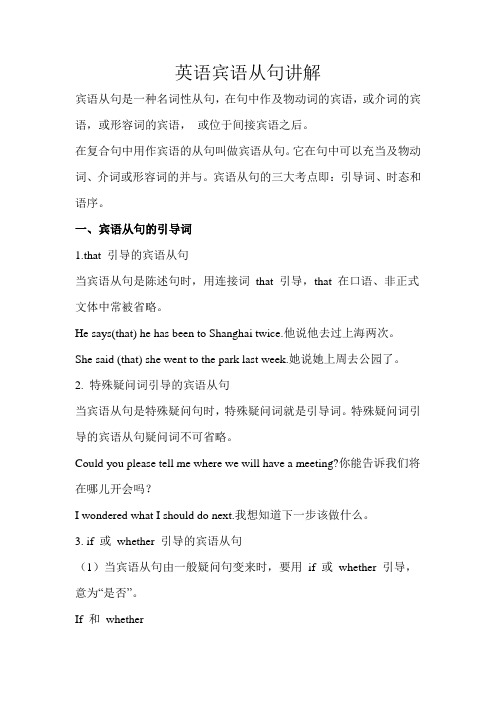
英语宾语从句讲解宾语从句是一种名词性从句,在句中作及物动词的宾语,或介词的宾语,或形容词的宾语,或位于间接宾语之后。
在复合句中用作宾语的从句叫做宾语从句。
它在句中可以充当及物动词、介词或形容词的并与。
宾语从句的三大考点即:引导词、时态和语序。
一、宾语从句的引导词1.that 引导的宾语从句当宾语从句是陈述句时,用连接词that 引导,that 在口语、非正式文体中常被省略。
He says(that) he has been to Shanghai twice.他说他去过上海两次。
She said (that) she went to the park last week.她说她上周去公园了。
2. 特殊疑问词引导的宾语从句当宾语从句是特殊疑问句时,特殊疑问词就是引导词。
特殊疑问词引导的宾语从句疑问词不可省略。
Could you please tell me where we will have a meeting?你能告诉我们将在哪儿开会吗?I wondered what I should do next.我想知道下一步该做什么。
3. if 或whether 引导的宾语从句(1)当宾语从句由一般疑问句变来时,要用if 或whether 引导,意为“是否”。
If 和whether只起到连接作用,不充当句子成分,一般情况下可互换,但if 常用于口语中,whether 常用于正式文体中。
I want to know if /whether he is waiting for me.我想知道他是否在等我。
Could you tell me if /whether you have been to Australia? 你能告诉我你是否去过澳大利亚吗?(2)下列情况下一般只能用whether:①与or not 连用时I don’t know whether he likes the movie or not. 我不知道他喜不喜欢这部电影。
初中英语语法知识点:定语从句
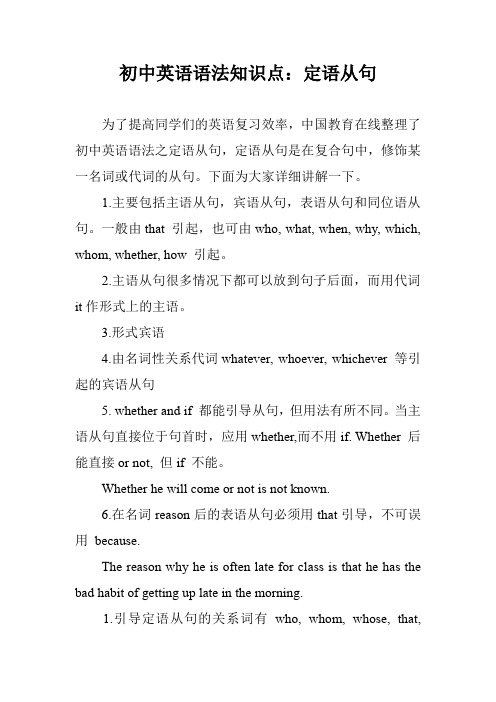
初中英语语法知识点:定语从句为了提高同学们的英语复习效率,中国教育在线整理了初中英语语法之定语从句,定语从句是在复合句中,修饰某一名词或代词的从句。
下面为大家详细讲解一下。
1.主要包括主语从句,宾语从句,表语从句和同位语从句。
一般由that 引起,也可由who, what, when, why, which, whom, whether, how 引起。
2.主语从句很多情况下都可以放到句子后面,而用代词it作形式上的主语。
3.形式宾语4.由名词性关系代词whatever, whoever, whichever 等引起的宾语从句5. whether and if 都能引导从句,但用法有所不同。
当主语从句直接位于句首时,应用whether,而不用if. Whether 后能直接or not, 但if 不能。
Whether he will come or not is not known.6.在名词reason后的表语从句必须用that引导,不可误用because.The reason why he is often late for class is that he has the bad habit of getting up late in the morning.1.引导定语从句的关系词有who, whom, whose, that,when, where, why and which. 在非限制定语从句中,只可用which, who, whose, where , when., 如果指代前面整个句子,多用which.2.当引导定语从句的先行词前有all, any, no, little, much, very first 等词,或先行词前为形容词最高级所修饰时,或先行词为all, anything, nothing, something, everything 时,从句的引导词只能用that.可做引导词引导定语从句,多和such, the same 连用。
英语语法从句类型总结
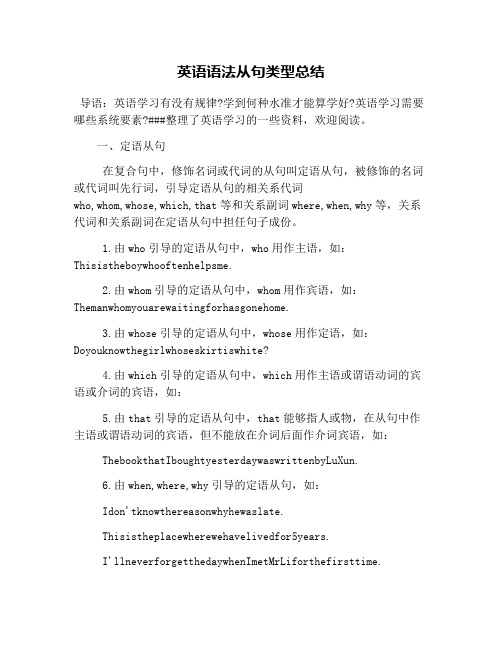
英语语法从句类型总结导语:英语学习有没有规律?学到何种水准才能算学好?英语学习需要哪些系统要素?###整理了英语学习的一些资料,欢迎阅读。
一、定语从句在复合句中,修饰名词或代词的从句叫定语从句,被修饰的名词或代词叫先行词,引导定语从句的相关系代词who,whom,whose,which,that等和关系副词where,when,why等,关系代词和关系副词在定语从句中担任句子成份。
1.由who引导的定语从句中,who用作主语,如:Thisistheboywhooftenhelpsme.2.由whom引导的定语从句中,whom用作宾语,如:Themanwhomyouarewaitingforhasgonehome.3.由whose引导的定语从句中,whose用作定语,如:Doyouknowthegirlwhoseskirtiswhite?4.由which引导的定语从句中,which用作主语或谓语动词的宾语或介词的宾语,如:5.由that引导的定语从句中,that能够指人或物,在从句中作主语或谓语动词的宾语,但不能放在介词后面作介词宾语,如:ThebookthatIboughtyesterdaywaswrittenbyLuXun.6.由when,where,why引导的定语从句,如:Idon'tknowthereasonwhyhewaslate.Thisistheplacewherewehavelivedfor5years.I'llneverforgetthedaywhenImetMrLiforthefirsttime.注意:先行词是表示地点时,如果从句的谓语动词是及物的,就用that(which),如果从句的谓语动词是不及物的,就用where引导。
ThisisthehouseWhich/thathehaslivedinfor15years.(Wherehehasliv edfor15year.)7.限制性定语从句和非限制性定语从句(1)限制性定语从句是句中不可缺少的组成部分,主句和从句之间不用逗号分开。
- 1、下载文档前请自行甄别文档内容的完整性,平台不提供额外的编辑、内容补充、找答案等附加服务。
- 2、"仅部分预览"的文档,不可在线预览部分如存在完整性等问题,可反馈申请退款(可完整预览的文档不适用该条件!)。
- 3、如文档侵犯您的权益,请联系客服反馈,我们会尽快为您处理(人工客服工作时间:9:00-18:30)。
语法内容----从句一.从句的分类主语从句(谓语之前)This is what he told me last night.表语从句(系动词之后)What he said is true.宾语从句(实意动词之后)Tell me what he said at the meeting.同位语从句名词之后,与名词是等同关系)The news that he will come makesme happy.(解释the news)定语从句(修饰名词或代词)The news that he tole me is true状语从句(修饰动词)1.)时间.....I stayed home while ha was away.(说明呆家的时间)2.)地点....You should put the book where it was.(说明放的位置)3. 原因....He didn’t come because he was ill.(说明没来的原因)4.)结果...He ran so fast that I couldn’t catch cup him(他跑得快导致的结果)5.) 目的...We left early so that we could catch the first train.(说明我们早出发的目的)6.) 条件...I will not lend the book to you unless you return it intime.(说明我借书给你的前提条件)7.)让步...(Although he may have told you, I still think she is notto be trusted.(说明就算退一步讲,我也不信任她)8.)方式...You should do as I tell you.(说明你要做的方式)9.)比较...The room is bigger than that one.(形容/副词的比较用法)二、从句的连接词(根据从句类型来用)1.名词性从句- 主语从句陈述句(that)宾语从句-----根据从句类型一般疑问句(weather/if)表语从句特殊疑问句(what/how/when/同位语...- where/why/who.)以宾从为例陈述句:He said that he could help me.(I can help you)一般问句He asked weather/if I could help him.( Can youhelp me?)特殊问句:He asked what I was doing.( What are you doing?He asked how I did it?.( How did you do it?)(2)主语从句的倒装(it 作形式主语)That he is a doctor is true.= It is true that he is a doctor千真万确,他是个医生。
Whether she comes or not makes no difference.= It is no difference whether she comes or not. 她来不来都没关系。
Who was responsible for the accident is not yet clear.= It is not yet clear who was responsible for the accident.还不清楚谁对此事负责人。
2.定语从句(根据先行词在从句中的成分确定)主语(人)--who(that可代)宾语(人)--whom(that可省可代)主语(物)--which(that可代)宾语(物)--which(that可省可代)定语(人的)--whose(物的)--whose状语(修饰动词状态)时间when地点where原因whyThe children who had been watching started to laugh.一直在旁观看的小孩们开始笑了起来。
(人主--who/that)The boy (whom) you saw yesterday is here now.你昨天见到的那个男孩现在就在那儿。
(You saw the boy, 人宾--whom(that)可省可代)The house whose windows are broken is scary.窗户破了的那所房子很恐怖。
(the windows of the house, 物的-whose=of which,定语)I shall never forget the day when I entered the university. 我永远不会忘记上大学的那一天。
This is the factory where I worked three years ago.这就是我三年前工作过的工厂。
(I worked in the factory)He didn’t tell me the reason why he was so sad.他没有告诉我他那么伤心的原因。
( I don’t know why he was so sad)(2)限定性和非限定性.....(不可用that)This is the book which(that) he gave me.(限定性定从)He gave me a book yesterday, which is useful. (没有which句子完整,which不可省也不可用that来代替)(3)As和which用于非限定定语从句As “正如.......”;(位置可前可后)Which “这.....”(因果关系,位置:主句,which...)He was late again, as could be expected. 他又迟到了,正如预料的那样。
He was late again, which made me angry.他又迟到了,这让我很生气。
(4)介词+which/whom...... (根据习惯搭配;上下文意义确定介词)The company in which I am working is a large one.我上班的那个公司是家大型公司。
( I am working in the company. The company is a large one. The person with whom you talked is a famous writer. 和你谈话的那个人是一位有名的作家。
(You talked with the person. The person is a famous writer)This is the program of which I was speaking.这就是我所说的节目。
(I wasspeaking of the program. This is the program.)(5)定语从句和同位语从句(修饰名词)定从--根据成分确定关联词(主宾定状,人/物)同位语-- 与被修饰名词是等同关系根据从句类型确(陈述;一般、特殊)对被修饰名词进一步说明The news which he told me made happy.(the news 物主--which)The news that he could come made me happy.(the news=he could come)(6)定语从句和强调句型强调句型---It is /was+被强调部分(除谓语外)+that +......定语从句--It is +名词/代词+ that+.....It is in this shop that we met yesterday. (去掉It is...that=We met in this shop yesterday)It is the shop where we met yesterday.(去掉It is...that句子不完整)(7)插入语位置:在关联词之后关联词不变含义变窄They went to the place where they believed they could find food.This is the book which he said is useful for us.3.状语从句的连接词---逐一记忆1.) 时间.....(1.)when 特指过去或将来的某一时刻(be doing/be about to)正当.....突然as 两个动作同时发生while 一段时间然而;却(AB两者的对比)He entered the room when the meeting was going on.(他进房间是会议进行的时候)He sang songs as he was talking a bath.(唱歌和洗澡两个动作同时进行)I stayed home while he was away.( 我待在家是在他离开的那段时间)He knew how to answer the question, while I couldn’t answer it.(他知道答案与我不知道怎么回答之间的对比)(2.)before (一段时间)之前after 在....之后until 直到...为止(A...延续...B)not....until 直到.....才(A...非延续性动词...B,not放句首,需倒装)I’ll wait until he comes back.我会等到他回来为止。
Not until he told me did I know it.直到他告诉我,我才直到这个消息。
(3)一...就as soon ashe moment=the minute=the instantimmediatelyonce放句首须倒装hardly/barely/scarcely....whenNo sooner......thanThe instant the result came out, she told us.结果一出来,她就告诉我们。
Immediately he came home, I told him about it.他一回家,我就把消息告诉他)Jack had hardly seen me when he left the room.(4) any time随时;任何时候each time 每次(个别)every time每次(整体)the day 那一天the year那一年You can call me any time you want to. 你随时都可以给我打电话。
